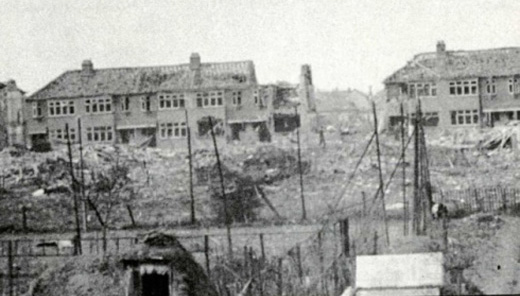The Blitz
There are massive night raids on London. 712 sorties are flown by the Luftwaffe dropping 1,180 tons of bombs and 153,000 incendiaries. They lose 2 aircraft. The docks and warehouses are the main targets. There is heavy damage to the East End, Walthamstow and East Ham. Among the notable places hit are the Royal Naval College at Greenwich and St Peter's Hospital in Stepney. Many public buildings are hit like museums, churches and hospitals. 1,400 fires are started. About 1,200 people are killed, 1,000 are seriously wounded and 150,000 houses are damaged.
Essex Road after the Bombing |
 |
Newcastle is hit by 120 planes from Luftflotte II. In the 5-hour attack 150 tons of high explosives and 50,000 incendiaries are dropped all across the region. Areas affected by this raid include Jarrow, North and South Shields, Hebburn, Gateshead, Wallsend, Tynemouth and Newcastle. Large fires are started in several of the Tyne Docks, timber stores and warehouses. There is much damage to residential and commercial properties. 40 people are killed and about 100 injured.
[Britain, Home Front
The first registration of women for war work under a new Employment Order begins.
[Greece
While the Italians advance in the Epirus, the Greeks find their retreat cut off by the SS Adolf Hitler Div, which has attacked on the Pindo and occupied the Metsovo Pass and the town of Grenená. For the Greeks, this is the end. The rearguards of the British expeditionary force take up position in Thermopylae to protect the re-embarkation of the main body.
Against the orders of his superiors, Gen Georgios Tsolakoglou, commander of the Greek army in western Macedonia, makes contact with the Germans to negotiate surrender.
Wavell is in Athens to meet Gen Wilson and Gen Thomas Blamey, the commander of the Australian forces. They decide that it will probably be necessary to evacuate their troops from Greece, but promise the Greeks that they will keep fighting as long as the Greeks themselves do so.
[Iraq
A British convoy begins to land troops from the 20th Indian Bde at Basra. A small British contingent has already been sent in by air to protect the air base at Shaibah, near Basra. Later in the month this force will be sent on to the Habbaniyah airfield. By a treaty of 1930 the British are entitled to send troops across Iraq to and from Palestine and with no prospect of immediate German help of any size Rashid Ali's new government cannot object at first to the British landings. In diplomatic exchanges they unsuccessfully oppose any additions to the British force. British reinforcements in fact arrive at Basra on the 29th. By this time the Iraqis will have decided to fight.
[Italian East Africa
The 1st South African Bde has been sent north from Addis Ababa along the road to Asmara in Eritrea and now comes up to Italian positions south of Dessie. The fighting lasts for 4 days before the Italians fall back before the advance.
[Mediterranean
Ships that are sunk in German air attacks include the Panamanian steamer Margit (3257t) at Kalkara Creek, Malta, and the Greek steamer Teti Nomikou (1822t) at Chalkis.
[World Affairs
Adm Darlan informs the League of Nations that Vichy is withdrawing French membership in the moribund international organization.
[